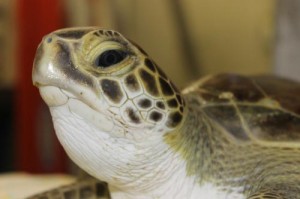
OCEAN CITY — A “cold-stunned” sea turtle rescued in Ocean City in November has completely recovered and is now ready for a re-release in sunny Florida after an extensive rehabilitation at the National Aquarium in Baltimore.
The juvenile green sea turtle was rescued in Ocean City by a volunteer with the Marine Animal Rescue Program (MARP) in late November after falling victim to the cold-stunned phenomena that affected thousands of sea turtles up and down the Atlantic coast through much of the winter. Hundreds of sea turtles were discovered on the beaches in the mid-Atlantic region and many were rescued and taken to rehabilitation centers including the National Aquarium.
The sea turtles hit patches of extremely cold water in their typical migratory patterns to warmer climates and the cold water literally stuns them to the point their bodies start to shut down and they wash up on beaches. One of green sea turtles rescued in Ocean City in November, now affectionately known as “Chipper,” has been rehabilitating at the National Aquarium for the last few months and is now fully restored and ready for re-release. Chipper’s name was chosen as part of the aquarium’s pattern this winter to name rescued sea turtles after “Top Gun” movie characters.
“Chipper has passed his pre-release exam and we are hoping to release him soon with several other turtles,” said National Aquarium Stranding Coordinator Jenn Dittmar this week. “We are still in the process of working with NOAA, the U.S. Fish and Wildlife Service and the state of Florida to monitor water temps and determine possible release locations and dates. The releases will occur somewhere in Florida.”
While Chipper will soon be released somewhere in Florida, it was certainly touch-and-go for a while and his future was in doubt. Chipper arrived at the National Aquarium with a dangerously low body temperature of just 37 degrees, roughly half of the normal green sea turtle body temperature of 70 to 80 degrees. A body temperature that low for a green sea turtle can be fatal and the National Aquarium staff had to be careful to warm Chipper slowly over several days. In fact, Chipper was so cold, aquarium staffers actually had to use ice to stabilize his temperature and prevent it from rising too quickly.
Once his temperature was stabilized, Chipper made an amazing recovery and frolicked in the aquarium pool. He has been eating lean proteins and lettuce, for example, over the last few months while preparing for a re-release. With a clean bill of health, Chipper is now ready for release somewhere in Florida.
